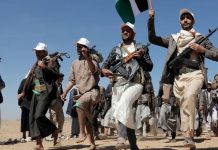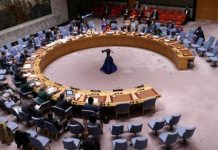UNITED NATIONS, Jul 13 (DNA):UN Secretary-General Antonio Guterres, standing alongside top officials in New York, underscored the essential need to bolster the UN agency assisting Palestine refugees (UNRWA) across the Middle East amid continued Israeli attacks on its mandate, staff, premises and operations.Speaking at a pledging conference for the agency, the UN chief Friday outlined the countless challenges facing Palestinian civilians in Gaza who are “forced to move like human pinballs across a landscape of destruction and death”.
“Hopelessness is the greatest ally of instability,” he warned, stressing that through its work, “UNRWA is one of the greatest factors providing hope and stability across a troubled region.”
The agency has been supporting critical services including education, health and social services to some 5.9 million Palestine refugees, including vulnerable groups such as women, children, and persons with disabilities.
It also administers 58 refugee camps, addressing the dire humanitarian needs of over 1.6 million people across Jordan, Lebanon, Syria, the Gaza Strip, and the West Bank, including East Jerusalem.
The annual pledging conference, held under the auspices of the General Assembly, serves as a vital platform to raise funds for these operations.
This year, however, the conference is being held under vastly different circumstances.
Gaza has become a place of immense suffering amidst daily military barrages in a conflict that was precipitated by the 7 October.
In the Gaza Strip, more than 38,000 Palestinians are reported to have been killed, a further 88,000 injured and about 90 per cent of population displaced – many several times.
Tensions are also boiling over in the West Bank, and there are mounting fears of a spillover of the war into Lebanon as Israeli forces exchange daily fire with Hezbollah.
With humanitarian needs across the enclave sharply skyrocketing, UNRWA also faces a severe funding crisis, with many donors suspending their funding after allegations made by Israel that some agency personnel were involved in the 7 October attacks.
Lacking clear evidence, many donor countries have resumed contributions following UN actions in response.
Of the 12 people implicated, the agency terminated the contracts of 10, another two are confirmed dead. An investigation by UN’s Office of Internal Oversight Services (OIOS) was also immediately launched and is ongoing.
Separately and prior to the allegations, the Secretary-General commissioned former French Foreign Minister Catherine Colonna to lead an independent review to assess UNRWA’s commitment to the humanitarian principle of neutrality.
She submitted her final report in April with key recommendations, which are being implemented.
UNRWA nevertheless faces massive gaps in matching resources with the needs and requires $1.2 billion to cover critical humanitarian needs until the end of the year.
The UN chief warned that without more support and financing for UNRWA, Palestine refugees “will lose a critical lifeline and the last ray of hope for a better future.”
“My appeal to everyone is this: Protect UNRWA, protect UNRWA staff, and protect UNRWA’s mandate – including through funding. Let me be clear: there is no alternative to UNRWA,” he stressed.
Guterres once again underscored the need to end the ongoing war, starting with an immediate humanitarian ceasefire in Gaza and an immediate and unconditional release of all hostages.
“Ultimately, only a political solution can bring an end to this conflict – one that realizes a vision of two States – Israel and Palestine – living side by side in peace and security, with Jerusalem as the capital of both States,” he said.
“I urge you to act now: act to instil hope in a place where it is in short supply; act to uphold the mandate of this General Assembly to sustain UNRWA; act in solidarity with Palestine Refugees and all the Palestinian people,” the UN chief concluded.
General Assembly President Dennis Francis echoed the Secretary-General’s call for support, urging donors to “transform rhetoric into reality” by ensuring that agency is sufficiently funded.
He urged all stakeholders – UN Member States as well philanthropic organizations, the private sector and individuals to contribute to the agency.
“This is not merely about funding, nor about the survival of an agency. It is about people and the survival of Palestine refugees – especially the children – across the Gaza Strip, Jordan, Lebanon, Syria, the West Bank, and East Jerusalem,” he said.
UNRWA Commissioner-General Philippe Lazzarini emphasized the immense suffering of both Palestinians and Israelis. He once again condemned the October 7 attack and called for the immediate release of all hostages.
Gaza has been “decimated”, he said, with over two million people living in dire conditions.
Children and women are particularly affected, with many children killed or severely injured. He highlighted a similar tragedy unfolding in the West Bank, with hundreds of Palestinians killed by Israeli forces and settlers.
Lazzarini also stressed that despite decades of providing stability and essential services, UNRWA is struggling under relentless attacks, with significant loss of life and damage to its facilities.
He also decried the mistreatment of UNRWA personnel and the use of its premises for military purposes by both Palestinian armed groups and Israeli forces, and criticized efforts to dismantle UNRWA, including social media attacks and legislative moves to label it a terrorist organization.
“UNRWA is targeted,” he stressed, “because of its role in safeguarding the rights of Palestine refugees, and because it embodies an international commitment to a political solution.”
He warned that a failure to push back will leave other UN entities and international organizations exposed to similar attacks.
The UNRWA Commissioner-General reiterated that the agency “is the backbone” of the humanitarian response in Gaza, and that it will remain critical for the transition from ceasefire to “day after”, providing essential services.
“If we maintain the status quo, the agency will crumble and millions of children, women and men will pay a heavy price”, he added.

















